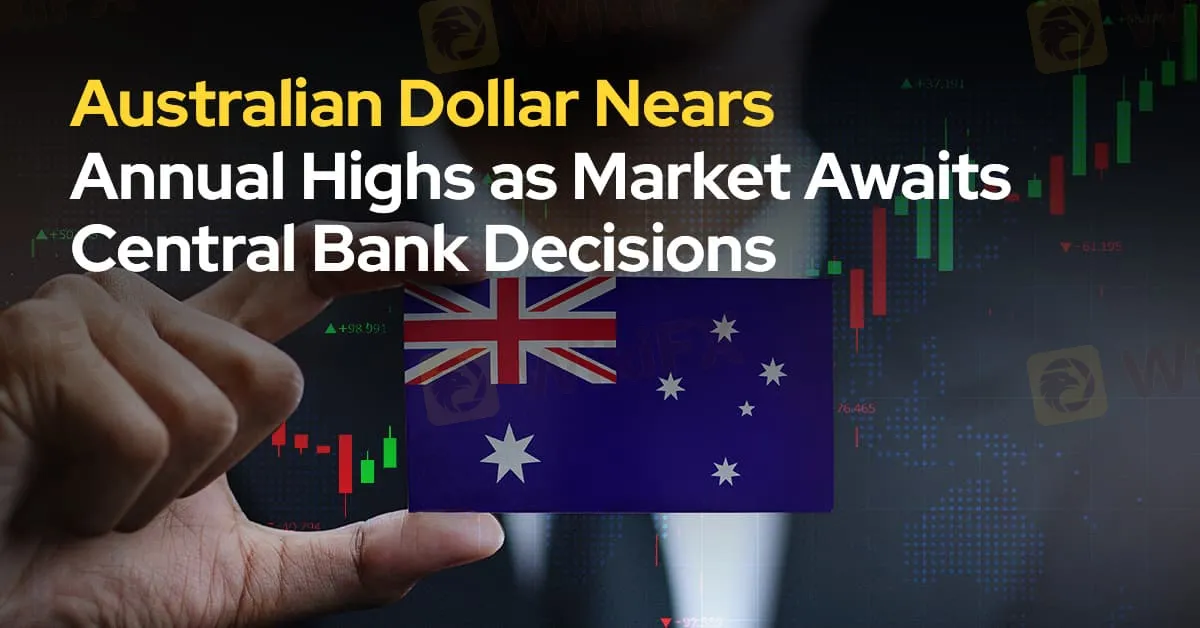简体中文
繁體中文
English
Pусский
日本語
ภาษาไทย
Tiếng Việt
Bahasa Indonesia
Español
हिन्दी
Filippiiniläinen
Français
Deutsch
Português
Türkçe
한국어
العربية
Australian Dollar Nears Annual Highs as Market Awaits Central Bank Decisions
Abstract:According to a report, the Australian dollar edged close to its highest point this year, trading at $0.6839 after a solid 0.45% increase.

According to a report, the Australian dollar edged close to its highest point this year, trading at $0.6839 after a solid 0.45% increase. This rise coincides with the Reserve Bank of Australia (RBA) expected to hold interest rates steady, prompting traders to speculate on any signals regarding potential easing. Among 44 economists surveyed, only four foresee a rate cut by December, while traders estimate a 60% likelihood.
The currency's strength is bolstered by recent stimulus measures from the People's Bank of China (PBoC), including a 50 basis point reduction in banks' reserve requirements, which contributed to a slight dip in the yuan. Initially, the yuan fell by 0.16% in offshore trading but later stabilized around 7.0590 per dollar. Markets analyst Tony Sycamore noted that once the RBA's meeting concludes, the Aussie might rally towards 70 cents by the end of the year.
Meanwhile, the Japanese yen remained stable at 143.495 against the dollar as traders anticipated insights from Bank of Japan Governor Kazuo Ueda regarding future interest rate adjustments. The euro, recovering from a nearly 0.5% decline driven by lackluster business activity surveys, was holding steady at $1.1105. Sterling, too, remained near a 2-1/2-year high at $1.33445, supported by the Bank of England's careful approach to potential rate cuts.
In summary, central bank policies and economic trends are pivotal in shaping the current currency landscape, creating an atmosphere ripe for volatility in the markets.

Disclaimer:
The views in this article only represent the author's personal views, and do not constitute investment advice on this platform. This platform does not guarantee the accuracy, completeness and timeliness of the information in the article, and will not be liable for any loss caused by the use of or reliance on the information in the article.
Read more

5 Risks associated with Grand Capital
You can avoid fraud, crypto scams, and similar traps simply by staying informed. If you regularly follow forex news, there’s a lower chance that you’ll fall victim to such scams. Being aware is the only way to stay safe. That’s why you also need to know about the Grand Capital broker and why it should avoided.

Avoid Trendify: 5 Red Flags Revealed
Trendify is nothing more than a scam broker. It is one of those forex brokers that acts genuine but is actually full of red flags. Before you invest and fall victim to its investment scam, its better to check out the risks involved with Trendify.

Forex Interbank Rate & How It Influences Your Trading
A forex interbank rate is nothing but the wholesale currency exchange rate that banks and other major financial institutions use to trade currencies among themselves. Read more about it.

10 Unlicensed Brokers Exposed – Check Now to Stay Safe!
Traders need to stay informed, as scam brokers are active in the forex market. It's a basic rule for forex beginners to stay updated and check the Warning List. Here is the Warning List of unauthorized brokers you should avoid.
WikiFX Broker
Latest News
FCA clarifies expectations on bullying, harassment and violence to deepen trust in financial service
Asia-Pacific markets mixed after Trump shifts goalposts on tariffs again
XS.com Expands Global Reach with Landmark Kuwait Launch
European markets set to open mixed amid fresh U.S. tariff threats
Top Wall Street analysts are pounding the table on these 3 stocks
Stock futures fall after Trump team says tariffs will go into effect on Aug. 1: Live updates
10 Unlicensed Brokers Exposed – Check Now to Stay Safe!
S&P 500 futures fall slightly as Trump threatens new tariffs, Tesla shares drop: Live updates
Stocks are lower despite Bessent saying several trade announcements are ahead: Live updates
Exposed: Ibell Markets - A Scam Broker That Does Not Allow Withdrawals
Currency Calculator


